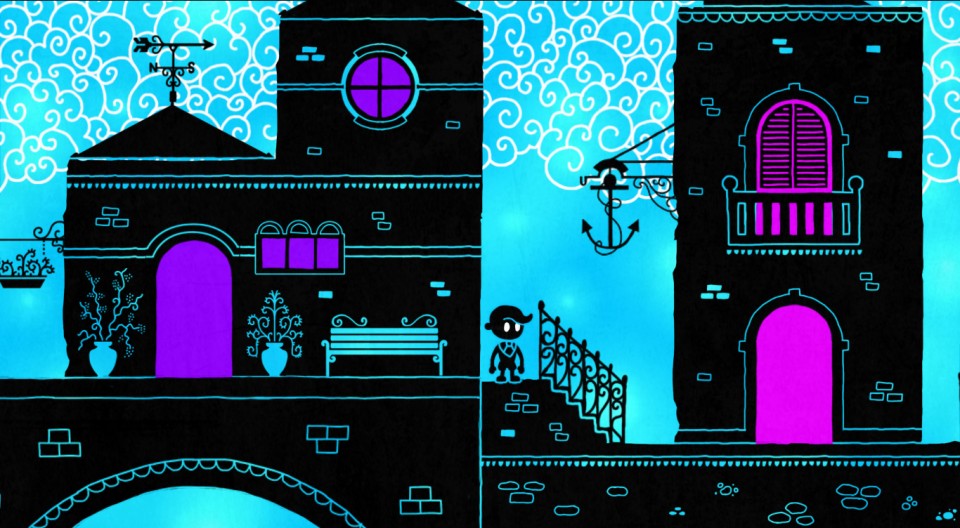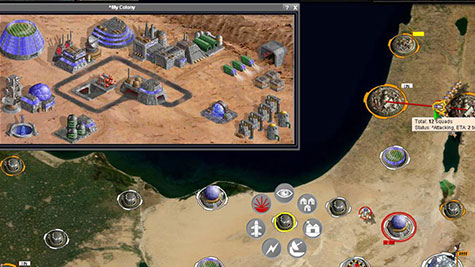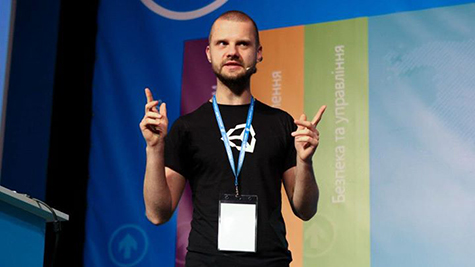Fiddlesticks was formed in late-2014 by Dan Da Rocha and Henry Hoffman. Da Rocha previously worked on the award-winning indie game Q.U.B.E, whilst Hoffman worked on the BAFTA-winning Windows Phone game Mush. After this Da Rocha and Hoffman tagged up to form Mudvark and create Mortar Melon, which has had over a million downloads to date. Now under a new banner, Fiddlesticks, the duo is working on multi-award winning game, Hue.
main
USA 2014Video Coverage
Omar Siddiqui is Building Better Communities in Cross-Platform Games | Casual Connect Video
“Android, at this point, is over 53 percent of all global device shipments this year,” Omar Siddiqui informed his audience during his session at Casual Connect USA 2014. “1.3 billion devices to be shipped this year. As you are developing your games, if you want to reach that mass audience, you obviously have to be thinking about both iOS and Android.”
DOWNLOAD SLIDES
Omar Siddiqui is the co-founder and CEO at Kiwi, a cross-platform game developer that has produced top games on Android and more recently on iOS. He and his co-founder Shvet Jain started the company in 2011 after building free-to-play games for almost a decade at Trippert Labs, Playdom, and Disney.
Tying It All Together
In Kiwi, Siddiqui has found an opportunity to tie together all his experiences, especially those gained from building top social games, such as Gardens of Time for Disney Playdom. They innovated on design and also achieved commercial success. He says, “That balanced approach continues to be our template for the types of products we want to continue to build going forward.”
Siddiqui gains the greatest satisfaction in his career through achieving goals as a team. These moments are his opportunity to take stock and appreciate what they have been able to do together, especially since it takes a lot of blood, sweat, tears, and luck to make a game tangible, starting with nothing but an idea.
For him, these meaningful moments range from successful products, such as Gardens of Time for Playdom or Shipwrecked and Westbound for Kiwi, to products that didn’t succeed commercially, but they were still proud to have pulled off as a team.
Mobile Convenience
Siddiqui emphasizes the advantages that he personally finds with the mobile gaming platform, particularly the accessibility and availability that make it convenient as his life has become busier. He has also noticed that he is increasingly using tablet gaming as a multi-tasking activity; this correlates with the data Kiwi is starting to see about how people are gaming.
These days, he plays Hearthstone quite actively. Although he is a casual player, he still enjoys competitive play. He particularly enjoys a quick, player-to-player experience with permutations and nuances he can figure out at his own pace.
Typically, he does not become involved in paying for F2P, preferring to grind his way through. But he did break down and pay for construction acceleration in Clash of Clans, and considers that to be quite a testimonial for the game.
His console gaming is considerably more limited than what he does on mobile; he is still running an old Xbox 360 and says he is definitely due for an upgrade.
Improving the Communities
Siddiqui emphasizes, “As a company, we are ensuring that we build great linked player experiences across iOS and Android devices, whether phones or tablets. Providing excellent cross-platform social gameplay and community building remains an area where we feel we can excel on in the coming years, as smart mobile devices are truly ubiquitous.”
They are following the extension of smart operating systems from mobile devices to televisions with interest. With their titles built on Android and iOS, as smart televisions and smart top-set boxes become common, new markets open up for them. Siddiqui also believes, “With the same casualization of gaming that becomes increasingly possible as households play familiar mobile casual games on their televisions, new forms of approachable gaming will emerge that could be very exciting.” Kiwi is planning for this future through experimenting with their existing games to these new platforms, as well as prototyping new games that are relevant for smart television play.
Siddiqui believes the emergence of international markets will make a tremendous impact on the entire game industry. He points out that these markets are both huge and unique. For example, new mobile gamers in China have very different preferences toward in-app purchases and game genres than players in other markets around the globe. He insists, “To capture these enormous opportunities, developers everywhere will have to rethink how they build and distribute games to better appeal to a global audience.”
ContributionsDevelopmentGame DevelopmentIndieOnlinePostmortem
Battle Dawn: Bringing Graphics to a Text-Based Online MMO
Tacticsoft is a small Israeli game development studio that started as a one-man project and grew into an international studio with a staff of 10 people around the world, and Battle Dawn, a successful MMO game that made millions in revenues. Their game designer and founder Michael Rosen started the studio as a hobby in 2005, and now shares his experience of building it from scratch without any external investment.
Making Games Since Childhood Through the Army
Building games has been my passion since I remember myself, whether they were board games, toys or computer games. I discovered coding when I was 10 and, from there on, made games as a hobby. Getting a toy or a game as a present from my parents was a rare occasion, so I found myself creating my own games from paper cards, pens and scissors. The first game I remember making was the “Stratego” game.

About 10 years ago, I started playing online browser-based games, particularly one called Planetarion. The moment I realized I set an alarm clock to get up in the middle of the night to send an attack, I understood I got addicted.
Back in those high school days, I was fiddling around with Flash 4 (yah, back in the days when it was all scripts), and thought that making a browser-based game with this technology was a good idea, and 2D graphics would stand out in the market with hundreds of text-based browser MMOs.
Time passed, and I had to give three years to the army (mandatory in my country). Each time I had a long guarding duty, I’d sketch out my game designs. I used weekends to play other existing games and see which parts of them I’d like to adopt into my own game design.
Once I finished my military service, I had tons of motivation to do something, but no money to start anything big.
A Map, MySQL database and Simple PHP Communications Making an Online MMO
I had no idea of the extent of the project I was stepping into. The only thing I had in my hands was the design document I had been rewriting for almost three years.
The first line of code was written in October 2005 for the concept of taking the mechanics of a text browser-based strategy MMO and placing it on an interactive map with a nice GUI, and thus get a niche in the market by becoming the only true 2D browser-based MMO. I started with building a Google Maps-kind of interface, added a MySQL database to hold the location of all the bases, and displayed them on the map using simple PHP communications. I had no money to buy expensive software (my Flash license came from my previous work as a freelancer), so I chose free dev tools. Lots of PHP coding was done in Notepad at the start 🙂

After six months, I reached a breaking point. Everything was working locally on my computer, but I had to test it online now, to see if it works with real players. It took me a whole month to gather the courage to spend $10 per month on a virtual server host. That was like a whole McDonalds meal once a month (I was calculating it that way back then), as well as being my first online purchase ever.
Once the game went online, I saw a lot of issues I didn’t take into consideration, such as bugs related to latency and slow internet connection. That gave me at least one more month of work before I opened the alpha version to public, which was very ugly as can be seen in the following screenshot:

Bringing Players Through Forums and Message Boards
It was the 1st of June 2006 when I opened the game for public for the first time. I still had no money for advertising campaigns, so had to turn to guerrilla marketing. I wrote about my game on Flash development forums & mailing lists, as well as a few other similar browser-based games message boards, in order to attract a small player base to test my game. My posts were very spam-like: “Come play the best flash MMO game online!” So most of these were deleted by the moderators. Nevertheless, some were picking interest.
The response at that time was overwhelming! In just a day, I had at least 200 people playing my game, as well as commenting on the forums with bug reports and suggestions for improvements and features
The next few months were a daily ping-pong game: players reporting bugs and issues and having me fix them. Most of the problems reported were game-breaking bugs: buttons not working, UI issues, and battle calculation errors. As the entire game UI was built with Flash, there were quite a few errors to deal with.

We encountered one of the funniest bugs right after a new feature was added to the game by the request of the players: nuclear missiles. It was supposed to kill all the troops standing in the target the missile hits. But I forgot to add a WHERE clause to the SQL statement! It resulted in a world nuclear holocaust killing all the armies around the world once the first nuke has hit its target!
Implementing PayPal: “Just Copying the Big Fish Out There.”
Once all major bugs were gone and the alpha version was stable, I moved on to implementing PayPal. As the online browser-based games market wasn’t quite developed at that time, there weren’t many services available for online payments in games. I saw that PayPal was widely used by all other existing browser-based games at that time, so I decided to use it, too. “Just copy the big fish out there” was the best advice I got at that time.
Making money on the game was basically the plan from the start, to be able to pay my rent and living costs while studying in a university. I just didn’t imagine it would eventually pay also for nine other people!

Five months of the game being online covered all expenses of development. After a long weekend of coding, I managed to get the PayPal API to work with my game, and offered $5 resource packages of metal, oil, workers, and energy that you could spend in the game to build an army faster than non-paying users. Again, like before, I just copied what other games were doing. One of those I learned from was called Gindis Army Commander, I even copied the design of the payment page from them. By the way, the founder of that game now works for my company.
Within two minutes of committing this new feature, the first purchase came in from Australia. Five minutes later, another one came from the US, and the payments just kept on coming every few minutes. It was a great feeling: to build something for almost a year, and see people enjoying it and willing to pay for it. The mechanics I used to persuade people to pay are now common in free-to-play games: time-based short cuts instead for waiting for the resources to be replenished for a whole day: spend $5 and get your silos full.
The first month generated about $400, the following one – almost $2000, the next one passed $4000 and the game building costs were already covered.
Eventually, as the player base grew, the shared virtual server became too slow to handle my game, and I moved to a separate hosting solution. But this time, there was no more financial issue.
Harnessing Your Community’s Creativity to Build a Team
In the beginning of 2007, the number of players of my game surpassed 2000. They came by word of mouth as well as game-voting sites such as pbbgames.com (no paid advertising was done yet). I was unable to cover the forums and in-game private messages on my own anymore. I just had to recruit community management staff.
The first member of my team was actually a player. Some community members stand out by being more active on the forums and sending me private messages which showed their special dedication to the game. So I gave this guy the keys to become the first world admin of Battle Dawn. Fortunately, he’s also a lawyer, so he knew exactly how to handle all those players and their complaints. This experience also helped me trust a person i never met face to face.
Other players helped me create better graphics for the game, contributing their free time to create new graphic assets to be implemented in the game. I was at a point when I’d appreciate any help, as the game was really ugly. The first contributions were completely free and voluntary. Later, when the game started to make more money, I went back to these guys and actually hired them to make some more professional art.
On the other hand, about 10 months after the alpha launch, the game was hacked. One of the players managed to get access to the world database and gave himself endless resources. Luckily, he hasn’t caused any serious damage, so a quick ban along with hiring some server security firm solved this issue. And actually an apology came from the hackers group associated with the incident a few days later. The guy who helped with securing Battle Dawn‘s servers was also one of the players, and now he’s been in my team for six years.
It’s much easier to find solutions to exploits and balance issues when you got a hive mind of hundreds of “core” players instead of one or two game designers.
Two Years After Launch: Game Becomes Unmanageable, Gets Rebuilt From Scratch
After two years of updates, the game project grew to be too large and patchy, and updating turned into a nightmare. The code became unreadable, and only I knew where everything was. The game couldn’t evolve any longer.
We had to rebuild everything from scratch: the billing platform, user management, admin tools, game client, make a new database, new art, and set up new servers. Nevertheless, it happened to be easier than we thought: having a live prototype as our design document made our lives much easier. The extra income and high profits allowed me to recruit more staff, including programmers and artists.

The income that Battle Dawn generates now allows us to work on other games projects. The market has changed, Facebook, iPhones, Android smartphones and tablets, iPads - all these were coming into play. New opportunities on those platforms made us start a new cross-platform game three years ago and released it online. We are continuing to keep our eye on creating great games.
Supermechs, the team’s cross-platform game, is available online and is coming to iOS soon.
Video Coverage
Oleg Pridiuk: Dare to Own the Task | Casual Connect Video
Pridiuk outlined recent success stories and explained what Unity had to offer for mobile AAA titles at Casual Connect Kyiv 2013.
Oleg Pridiuk, Technical Evangelist at Unity Technologies, is somewhat unusual in coming to game development from a background in mobile, but not in gaming. At the beginning of the iPhone era, when Nokia and Symbian were strong players in the industry, he was a technical journalist who became interested in mobile.

Unity at the Start
When he began with Unity, it was a startup, with a team of twenty. At that time, every team member had multiple responsibilities; rather than having a single job description, all team members did their best using all their skills. Pridiuk manned the camera, blogged, wrote copy, translated, fixed hardware and even reinstalled windows. He emphasizes, “The important thing is to dare to own the task. The skills needed to deliver come along, whether it is programming or wood cutting.”

Eastern European Evangelism
He became Unity’s mobile specialist, working mainly with developer relations and quality assurance. Since becoming Technical Evangelist in April 2012, his focus has mainly been on Eastern Europe, including Russia, Ukraine and Poland for sales, tech support and publishing. In Russia and the Ukraine, he established himself as a technical and business representative for Unity, and he established business relations between Unity Games China and the top Russian games development houses.

At Casual Connect Kyiv, Pridiuk announced that Unity is becoming more and more suitable for large cross-platform titles.
In his free time, he enjoys skateboarding, biking, and listening to a variety of music genres from Black Metal to Rachmaninov or Tchaikowsky. He believes, “Music is an instrument, a tool. It serves certain purposes, and those differ.”
Mmmmm…Whiskey.

Before joining Unity, Pridiuk considered that downshilfting and starting a whiskey distillery in Scotland might be an enjoyable way to live. But he claims, “You cannot escape gamedev. It catches you wherever you are.” So he stays in the games industry because games make people happy, and that is a trend he can totally support.
A career in the games industry is filled with challenges, and Pridiuk’s is no exception. He points out that the biggest challenge for every fast-growing company is to grow along with it. This is difficult when change is happening so quickly. The rules, the environment, the people around you, and the product itself are all evolving in multiple dimensions. Suddenly, your company is not the same one you joined.
But there are also moments that bring great satisfaction. Pridiuk says his proudest moment was when the Unity startup was first mentioned in Engadget.
Ressurection of the Indie
Looking ahead to what is coming next is his favorite topic. Over the next few years, he foresees that video will become the new photo. He also expects to see sensors, wearable computers, and quality multi-layer 3D printing using different materials. And he believes we will see small startups taking over bigger industries, those owned by mammoth corporations today. And mandatory classes in programming and design (preferably in Unity!) will be in schools and even kindergartens. He is already beginning to see these classes today.
Video Coverage
Jill Schneiderman: Rapidly Shifting to Mobile | Casual Connect Video
Jill Schneiderman moderated Battle of the Work for Hire Studios!, where two companies with the same RFP pitched their ideas to the audience. The audience was able to witness different methods to approaching a pitch, and even decided the winner!
The Best Job in the World
Jill Schneiderman, VP Games at SGN, runs production and operations out of the San Francisco office. She says, “I have the best job in the world! I get to work with talented, smart people every day to make fun games.” Her appreciation for the team is clear as she tells us she is proud of their creativity, talent and incredible work ethic as, on a daily basis, they push past the boundaries of what she thinks is possible.
Becoming Platform Agnostic
The rapid shift to mobile over the past few years has largely defined the strategy at SGN. Since they foresaw this shift before it happened, they were able to craft their cross-platform strategy around it.
For the past two years, they have been refining their MasterKey technology. This is a technology which allows a game to be developed once and then published on iOS, Facebook, Amazon, Google Play and other platforms simultaneously. She believes, “It is extremely important not to be tied to one platform and for games to be technologically agnostic.” Users can, for example, play a game on Facebook at work, on mobile phones on the way home and on a tablet at home. Jill feels, “Our cross-platform technology has been a significant component of our success at SGN.”
Jill asserts she is all about games, personally and professionally. In her free time, she is constantly playing games: online games, mobile games, board games, cards and lots of crossword puzzles. And she plays competitive backgammon at tournaments in the Bay area.
Emphasize Content
The advice Jill offers for making a better product is directed toward EA/PopCap, although it can be applied much more broadly: “Emphasize content!” Since Plants Vs Zombies 2 is coming out soon, she suggests PopCap keep it as close to the original as possible, but with new levels, some new plants and zombies, and interesting new challenges. She points to the excellent job Ironhide did with Kingdom Rush Frontier. “It is essentially Kingdom Rush 2.0; exactly the same game but with new levels, more expansive use of heroes, and fun new challenges.”
New Gamers Every Day
Over the past few years, Jill has noticed an interesting trend: people who previously games did not play games at all have now started to play. They began by playing games that were quite light from the games perspective; although they were technically games, they did not require extensive critical thought or strategy. But now this demographic is adopting more and more complex games. For example, the wide acceptance of Candy Crush shows that people are willing to be challenged and to think strategically. In the future, Jill expects this trend will dramatically increase. SGN is working to meet this new situation by designing games that have broad appeal for this demographic, but that also have deep and thoughtful mechanics which can hold their attention as they cross over to become true gamers.










